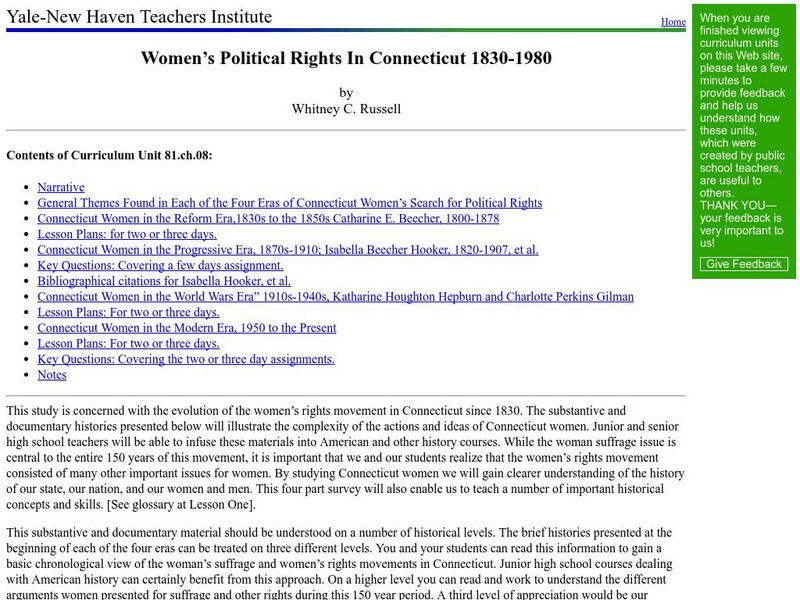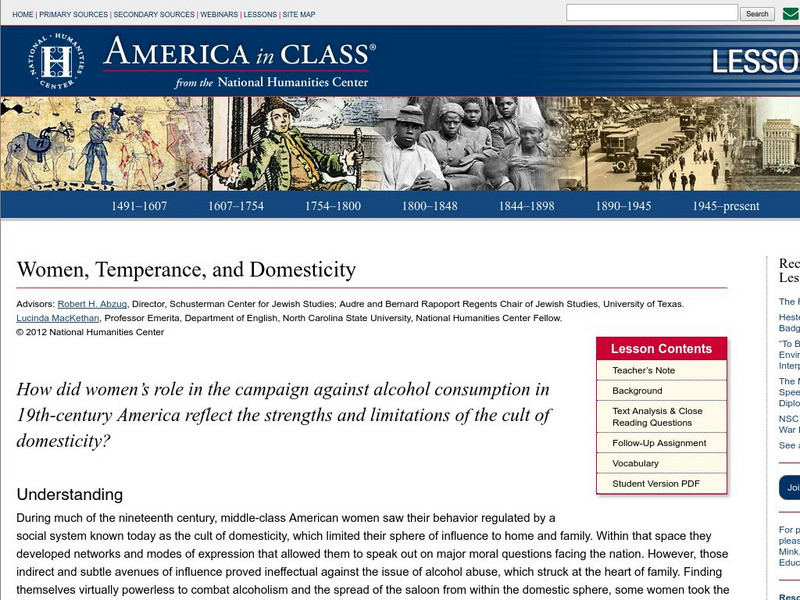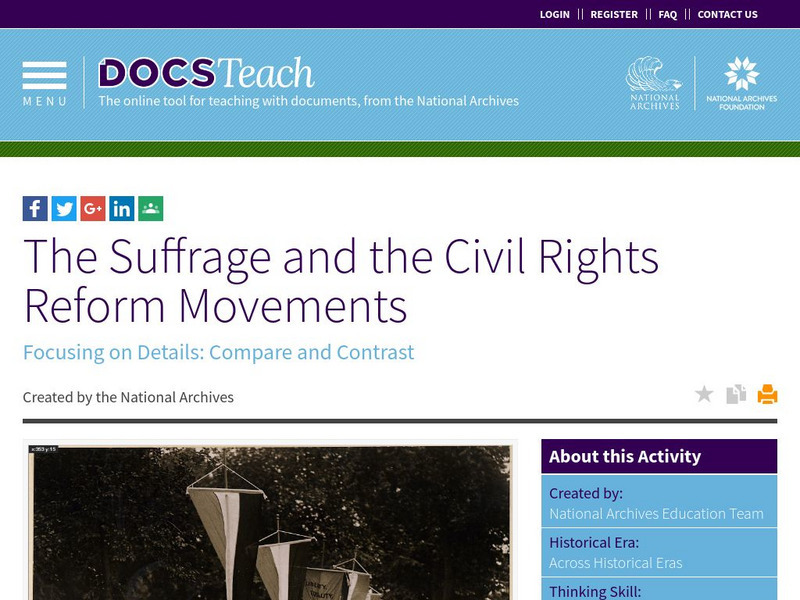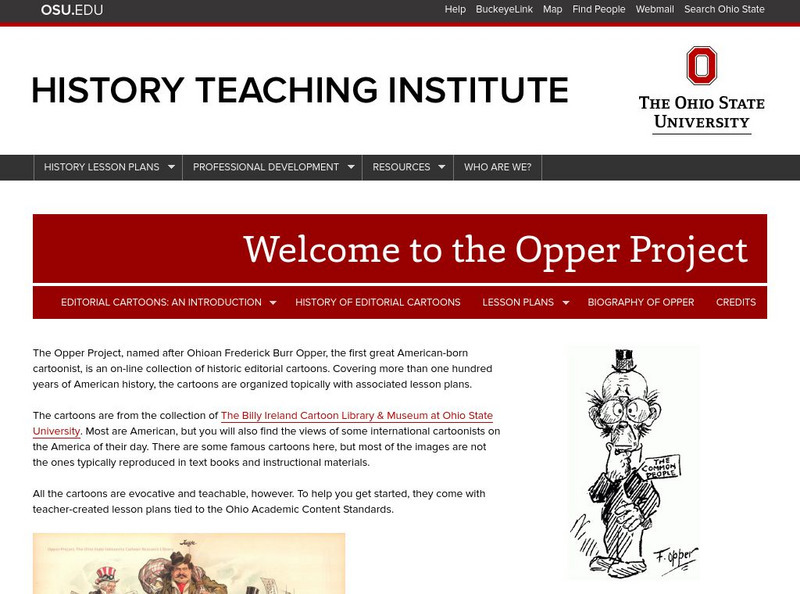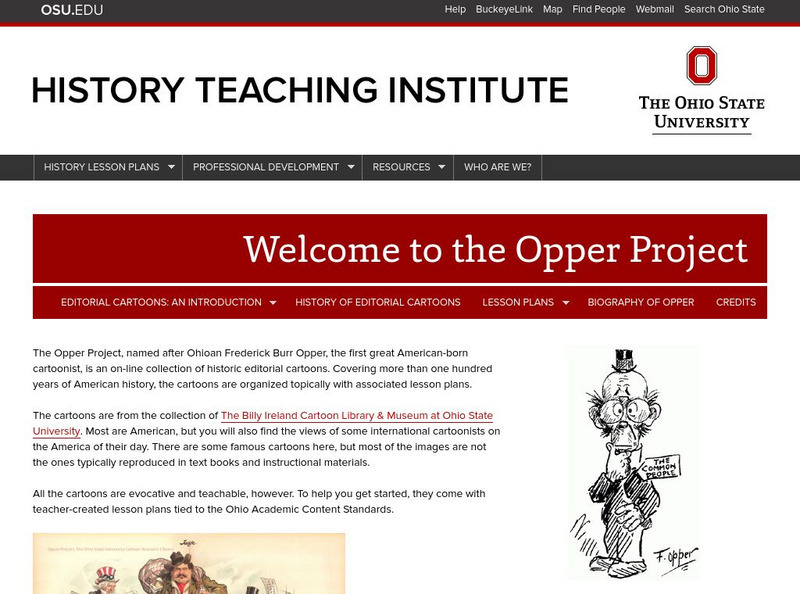National Women’s History Museum
National Women's History Museum: Seneca Falls and Suffrage
Using the Chester Comix panels, students will explore and discuss the Suffrage Movement, the purpose of the Seneca Falls Convention and the contributions to equality made by four key figures: Elizabeth Cady Stanton, Frederick Douglass
Yale University
Yale New Haven Teachers Inst.: Women's Political Rights in Connecticut 1830 1980
Teachers and students alike can check out this site to learn about the women's suffrage movement in Connecticut. The brief history is followed by lesson plan suggestions.
iCivics
I Civics: A Movement in the Right Direction (Infographic)
Use this infographic to show students how two different approaches to the women's suffrage movement worked to grant women the right to vote.
Library of Congress
Loc: Teachers: Suffrage Strategies: Voices for Votes Lesson Plan
Students will learn all about the history of suffrage for women and what influences were used to change people's attitudes. They will then use their understanding to create a modern-day election document of ephemera, for example, a...
National Women’s History Museum
National Women's History Museum: The Road to Suffrage
In this lesson plan, learners will use the Suffrage Timeline to explore the women, ideas, and action that led to the ratification of the 19th Amendment in 1920 and discuss the Woman Suffrage Movement as a model for peaceful activism.
National Endowment for the Humanities
Neh: Edsit Ement: Who Were the Foremothers of Women's Equality?
Which women made significant contributions to the early Women's Rights Movement in the U.S.? In this teaching unit, students will discover the women involved in the formative years of the struggle for women's rights and the history of...
National Women’s History Museum
National Women's History Museum: Seneca Falls Convention
Students will examine primary sources about the Seneca Falls Convention in 1848 to understand why a women's rights movement was necessary to gain greater rights for women.
University of California
The History Project: Ideas and Strategies of the Woman Suffrage Movement
The campaign for woman suffrage in the U.S. began with the Seneca Falls Convention in 1848. Sixty years later, however, women could vote in only four states: Colorado, Utah, Idaho and Wyoming. In 1910 the state of Washington voted nearly...
Other
Wiwhc: Suffrage When, Where, and Obstacles to Overcome
This online lesson compares aspects of women's suffrage from diverse cultures. Includes political cartoons from around the world.
PBS
Wnet: Thirteen: Freedom: A History of Us: Working for Freedom: Susan B. Anthony [Pdf]
A lesson plan from the producers of the 16-episode PBS series "Freedom: A History of US" designed to aid understanding of Susan B. Anthony's contributions to the women's suffrage movement. Students will look at the language of the...
National Humanities Center
National Humanities Center: America in Class: Women, Temperance Reform, and the Cult of Domesticity
Lesson on how women's role in the campaign against alcohol consumption in 19th-century America reflected the strengths and limitations of the cult of domesticity. Complete set of resources for a comprehensive study.
Library of Congress
Loc: Teachers: Suffragists and Their Tactics Lesson Plan
Young scholars work with two document collections, "Votes for Women: Suffrage Pictures: 1850-1920" and "Votes for Women: 1848-1921", to understand how the suffragists changed the requirements for voting in America.
US National Archives
National Archives: The Suffrage and the Civil Rights Reform Movements
Two reform movements that changed American history - Women's Suffrage and the Civil Rights Movement. View two iconic pictures from these movements and compare and contrast them along with answering critical thinking questions.
National Endowment for the Humanities
Neh: Edsit Ement: Voting Rights for Women: Pro and Anti Suffrage
In this lesson plan, students will consider "Voting Rights for Women: Pro- and Anti-Suffrage." The plan includes worksheets and other student materials that can be found under the resource tab.
US National Archives
Nara: Teaching With Documents: Petition of Amelia Bloomer Regarding Suffrage
Amelia Bloomer was a prominent advocate of women's rights in the 19th century. She invented bloomers to replace the skirt hoop, in an effort to free women from much of their cumbersome apparel. She later used her newspaper, The Lily, to...
University of California
History Project: Women Outside the Compass 1880 1922
Lesson on women and the push toward equality in which students analyze primary source text and images to evaluate the significance of women working for equal rights.
Varsity Tutors
Varsity Tutors: Web English Teacher: Louisa May Alcott
Delve into the writing of Louisa May Alcott when you check out this resource. This site features links to lesson plans and activities for "Little Women" along with biographical information on Alcott.
PBS
Pbs Learning Media: Sojourner Truth: Abolitionist and Women's Rights Activist
Through two primary source activities and a short biographical video, students will understand the remarkable career of this persevering woman who lived up to her self-chosen name.
Ohio State University
Opper Project: Using Editorial Cartoons to Teach History (Lesson Plans)
Two dozen lessons that focus on using political cartoons as primary source resources for teaching American history. Lessons cover a range of topics in U.S. history from the Civil War era forward and are linked to Ohio content standards.
Ohio State University
Opper Project: Using Editorial Cartoons to Teach History (Lesson Plans)
Two dozen lessons that focus on using political cartoons as primary source resources for teaching American history. Lessons cover a range of topics in U.S. history from the Civil War era forward and are linked to Ohio content standards.
Alabama Learning Exchange
Alex: Let's Talk Socratically
For this instructional activity you will be using the Socratic Seminar Instructional Method. The Socratic Seminar is a great way to get students involved. Socratic seminars are useful in that they teach students to make a point through...
Library of Congress
Loc: Her Story
A rich Library of Congress resource page that is filled with links to historical and primary documents offering a female perspective throughout history. Lesson plan links are also given.

